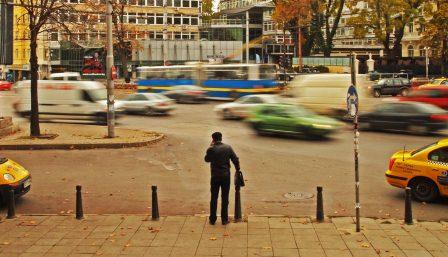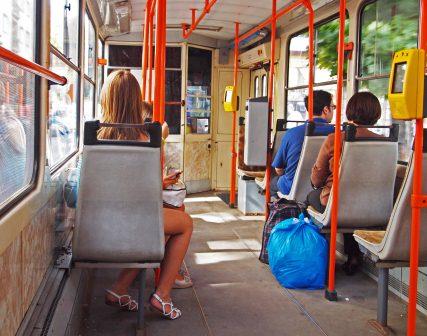From Chicago to Sofia: The Other Europe
 My name is Tom and I’ve been living in Sofia, Bulgaria, with my family since August 2011. I grew up in the Chicago area in the U.S., and have also lived and worked in Boston, Florida and New York City. This is actually my third expat experience; I lived in Belgium in the early 1990s and China in the late ‘90s.
My name is Tom and I’ve been living in Sofia, Bulgaria, with my family since August 2011. I grew up in the Chicago area in the U.S., and have also lived and worked in Boston, Florida and New York City. This is actually my third expat experience; I lived in Belgium in the early 1990s and China in the late ‘90s.
1. Why did you move abroad?
Having lived overseas before, we were anxious to share the experience with our young daughter. And we had been hoping in particular to spend some time in Eastern Europe, where my wife had spent a year earlier in her career. When she got an offer to work as an administrator at an international school here, it was an easy decision.
2. How do you make a living?
I’m a freelance writer and journalist. Right now I’m focusing mostly on education coverage, a specialty I developed over the last decade while working on the staff at the St. Petersburg (Florida) Times and other U.S. newspapers. I began my career as a middle and high school teacher, including stints teaching at international schools in Brussels and Shanghai.
3. How often do you communicate with home and how?
We do our best to have a Skype conversation with our families every week, and often email when we have news. And they read my blog, which helps them to see things through our eyes.
4. What's your favorite thing about being an expat in Bulgaria?
Just the sheer adventure of being in an interesting new place. Bulgaria is still relatively unknown and undiscovered for Americans, and we have found it to be pleasantly different from other parts of Europe. You can find great restaurants and cafes, and buy pretty much any consumer product you need as long as you’re not fussy about brands.
But you can also stumble across great artifacts from Bulgaria’s recent and historical past. Monuments from Communist times are all over the place, and they’re still digging up Roman and Thracian ruins right in downtown Sofia. We enjoy the challenge of learning a Slavic language and culture, and the fact that Bulgarians have so many unique holidays and customs. It feels European, but at the same time very different and a bit more remote, and we enjoy being off the beaten track.
5. What’s the worst thing about being an expat in Bulgaria?
That’s a hard one, because we’re really having a good experience so far. I think the distance from family and friends in the U.S. has been a challenge; even though modern communications make it easy to stay in touch, it feels far away.
6. What do you miss most?
Errands do sometimes take longer to accomplish here, and you have to relearn skills (like driving) that you thought you’d mastered in your home country. America is nothing if not convenient, so I suppose we miss that a bit. We thought we’d be able to stream Netfix movies and TV shows from U.S. networks, but a lot of them are blocked in Bulgaria – due not to censorship, I think, but lack of licensing agreements. We were surprised by that. And of course we have favorite restaurants that haven’t gotten to Sofia yet. Grilled meats are a specialty here, but there’s nothing like a Five Guys hamburger and fries, is there?
7. What did you do to meet people and integrate in your new home?
As a journalist, I’ve had lots of opportunities to meet Bulgarians. And we’ve enjoyed making new friends in our school community, which includes many locals as well as expat staff and families from a variety of countries.
8. What custom/ habits do you find most strange about your adopted culture?
Everyone will say the Bulgarian head waggle – a shake that looks like ‘No’ but means ‘Yes’ – takes some getting used to.
9. What is a myth about your adopted country?
To the extent that Americans are aware of Bulgaria at all – and I’m sorry to say that awareness is too low – people associate it almost exclusively with its pre-1990 image in the West. They imagine some mix of socialist deprivation, spies and bad cars.
To be sure, Bulgaria is a poor country compared to much of Western Europe, but in the global rankings it’s classified as “middle income” and far more affluent than many places around the world. It has glassy malls, fancy stores, movie theaters, gorgeous Black Sea beaches, lush forests, scenic mountain ranges, good wine and funny pop music. And tourists from the West find that their money goes farther here than just about any other country in Europe, which means you can actually afford the fancy hotels and restaurants once in awhile.
10. What advice would you give other expats?
Come with an open mind and treat life overseas as an adventure. Don’t listen to people who have bad things to say about the host culture, or any culture. Take the lack of English-language TV as a golden opportunity to read more. Memorize the Cyrillic alphabet right away, bring a Lonely Planet Phrasebook, and try to learn a new Bulgarian phrase every day. Remember who’s the guest, and don’t get mad if people don’t speak your language. Be patient. Have fun.
11. When and why did you start your blog?
I started it within a few weeks of arriving, and since WordPress rocks, it was relatively easy to set it up.
I wanted to capture the experience of being in a new place while it was still fresh. From my previous expat experiences I knew that this feeling of novelty would wear off. And I was conscious of the fact that I was blogging from a place that many Americans don’t know much about. That’s why I chose to title the blog The Other Europe. I wanted to make this blog about being in that new place, rather than focusing it just on me and my personal experiences, and to focus on the sorts of “daily life” topics that tourists often miss. In a way, I think that’s what the whole expat experience should be about – moving from a superficial, touristic perspective to a deeper understanding of a place that includes real people and cultures.
12. How has the blog been beneficial?
Blogging keeps me writing and helps me distill and make sense of the rush of new experiences that comes with expat life. And I have enjoyed using it as a platform for photos as well as writing. I’m keeping it separate from my paid journalism, in part because people don’t generally pay for things you’ve already published on your own blog. But having it has given me an excuse to explore and discover things that are often useful on those paid jobs.
Bulgarians have told me they enjoy seeing their country through a foreigner’s eyes, and fellow expats say they’re learning things about their new home. Hopefully I can continue to make the blog a place where everyone feels welcome and engaged.

Tom's blog, The Other Europe
Find out more about being an expat with Easy Expat's
To be considered for an interview (as well as other articles), add your blog to BlogExpat!
Part of the EasyExpat.com adventure since 2008. Drink, Travel, Write